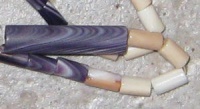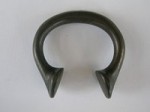Money and how it works is probably one of the most interesting things on earth.
It is fascinating and mysterious how money appeared on earth. Most things we enjoy can be traced back to a particular inventor or civilisation. But interestingly money appeared in a similar way in civilisations all over the earth at times when these places were not connected in any way.
 For example, West Africa traded in decorative metallic objects called Manillas, American Indians used Wampum, and the Fijian economy was based on whales teeth, some of which are still legal tender today. There has been a variety of accepted currency such as shells, amber, ivory, decorative feathers, cattle including oxen & pigs, a large number of stones including jade and quartz which have all been used for trade across the world.
For example, West Africa traded in decorative metallic objects called Manillas, American Indians used Wampum, and the Fijian economy was based on whales teeth, some of which are still legal tender today. There has been a variety of accepted currency such as shells, amber, ivory, decorative feathers, cattle including oxen & pigs, a large number of stones including jade and quartz which have all been used for trade across the world.
 No matter how primitive a society, our ancestors used all sorts of things for ‘money’. As colourful as some of them are, Money is simply an object which everyone agrees upon its value and is prepare to exchange.
No matter how primitive a society, our ancestors used all sorts of things for ‘money’. As colourful as some of them are, Money is simply an object which everyone agrees upon its value and is prepare to exchange.
When a person who has what you need might not need what you have to trade, then ‘Money’ solves that problem. Real value with each exchange, and everyone gaining from the convenience.
The idea of money is really inspired which might explain why so many diverse minds came up with it.
And then entered the Money-Changers…
“History records that the money changers have used every form of abuse, intrigue, deceit, and violent means possible to maintain their control over governments by controlling money and its issuance.”
President James Madison
Money, money, money, it’s always just been there, right? Wrong.
Oh, ok. But obviously it is issued by the government to make it easy for us to exchange things. Nope, wrong again!
Truth is most people don’t realise that the issuing of money is essentially a private business, and that the privilege of issuing money has been a major bone of contention throughout history.
Wars have been fought and depressions have been caused in the battle over who issues the money; however the majority of us are not aware of this, and this is largely due to the fact that the winning side became and increasingly continues to be a vital and respected member of our global society, having an influence over large aspects of our lives including our education, our media and our governments.
While we might feel powerless in trying to stop the manipulation of money for private profit at our expense, it is easy to forget that we collectively give money its value. We have been taught to believe printed pieces of paper have special value, and because we know others believe this too, we are willing to work all our lives to get what we are convinced others will want.
An honest look at history will show us how our innocent trust has been misused.
Let’s start our exploration of money in 33A.D. when Jesus expresses His anger toward the money-changers.
